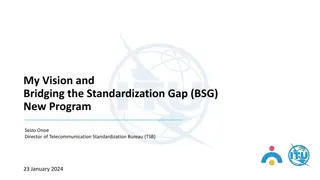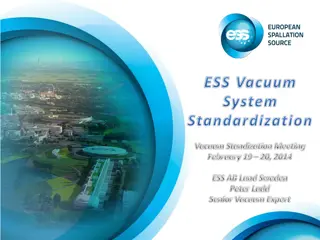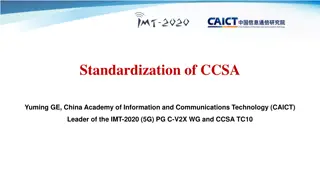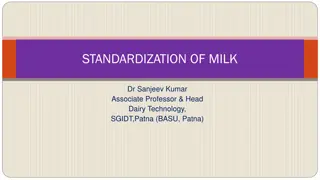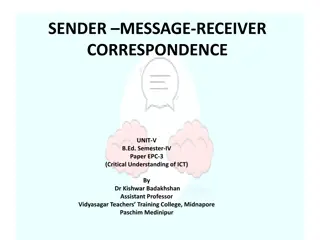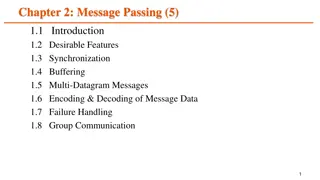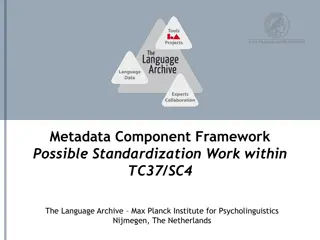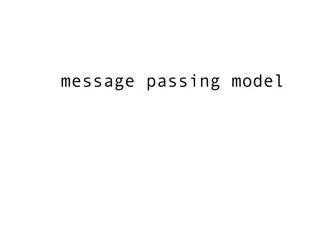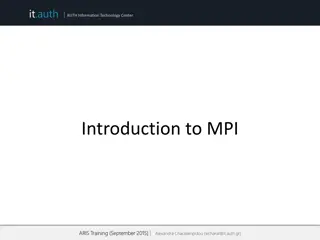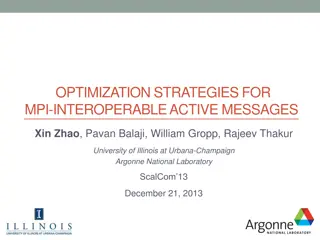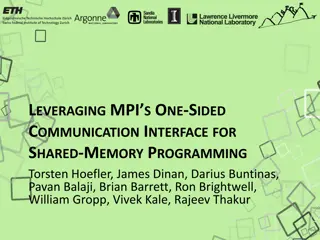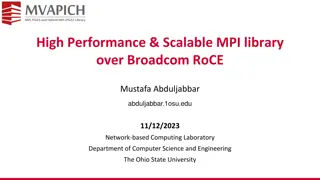Understanding Message Passing Interface (MPI) Standardization
Message Passing Interface (MPI) standard is a specification guiding the development and use of message passing libraries for parallel programming. It focuses on practicality, portability, efficiency, and flexibility. MPI supports distributed memory, shared memory, and hybrid architectures, offering explicit parallelism for programmers. The standardization of MPI ensures widespread adoption, portability, performance optimization, extensive functionality, and availability of implementations. Documentation for all MPI versions is accessible online.
- MPI Standardization
- Parallel Programming
- Message Passing
- Distributed Memory
- Performance Optimization
Download Presentation

Please find below an Image/Link to download the presentation.
The content on the website is provided AS IS for your information and personal use only. It may not be sold, licensed, or shared on other websites without obtaining consent from the author. Download presentation by click this link. If you encounter any issues during the download, it is possible that the publisher has removed the file from their server.
E N D
Presentation Transcript
Message Passing Interface (MPI) by Blaise Barney, Lawrence Livermore National Laboratory
An Interface Specification MPI is a specification for the developers and users of message passing libraries. By itself, it is NOT a library - but rather the specification of what such a library should be. MPI primarily addresses the message-passing parallel programming model: data is moved from the address space of one process to that of another process through cooperative operations on each process. Simply stated, the goal of the Message Passing Interface is to provide a widely used standard for writing message passing programs. The interface attempts to be: Practical Portable Efficient Flexible The MPI standard has gone through a number of revisions, with the most recent version being MPI-3. Interface specifications have been defined for C and Fortran90 language bindings: C++ bindings from MPI-1 are removed in MPI-3 MPI-3 also provides support for Fortran 2003 and 2008 features Actual MPI library implementations differ in which version and features of the MPI standard they support. Developers/users will need to be aware of this.
Programming Model Originally, MPI was designed for distributed memory architectures, which were becoming increasingly popular at that time (1980s - early 1990s). As architecture trends changed, shared memory SMPs were combined over networks creating hybrid distributed memory / shared memory systems.
Programming Model MPI implementors adapted their libraries to handle both types of underlying memory architectures seamlessly. They also adapted/developed ways of handling different interconnects and protocols. Today, MPI runs on virtually any hardware platform: Distributed Memory Shared Memory Hybrid The programming model clearly remains a distributed memory model however, regardless of the underlying physical architecture of the machine. All parallelism is explicit: the programmer is responsible for correctly identifying parallelism and implementing parallel algorithms using MPI constructs.
Reasons for Using MPI Standardization - MPI is the only message passing library which can be considered a standard. It is supported on virtually all HPC platforms. Practically, it has replaced all previous message passing libraries. Portability - There is little or no need to modify your source code when you port your application to a different platform that supports (and is compliant with) the MPI standard. Performance Opportunities - Vendor implementations should be able to exploit native hardware features to optimize performance. Any implementation is free to develop optimized algorithms. Functionality - There are over 430 routines defined in MPI-3, which includes the majority of those in MPI-2 and MPI-1. Availability - A variety of implementations are available, both vendor and public domain.
Documentation Documentation for all versions of the MPI standard is available at: http://www.mpi-forum.org/docs/
Open MPI Open MPI is a thread-safe, open source MPI-2 implementation that is developed and maintained by a consortium of academic, research, and industry partners. Open MPI is available on most LC Linux clusters. You'll need to load the desired dotkit package using the use command. For example:use -l (list available packages) use openmpi-gnu-1.4.3 (use the package of interest) This ensures that LC's MPI wrapper scripts point to the desired version of Open MPI. More info about Open MPI in general: www.open-mpi.org
Communicators and Groups MPI uses objects called communicators and groups to define which collection of processes may communicate with each other. Most MPI routines require you to specify a communicator as an argument. Communicators and groups will be covered in more detail later. For now, simply use MPI_COMM_WORLD whenever a communicator is required - it is the predefined communicator that includes all of your MPI processes.
Rank Within a communicator, every process has its own unique, integer identifier assigned by the system when the process initializes. A rank is sometimes also called a "task ID". Ranks are contiguous and begin at zero. Used by the programmer to specify the source and destination of messages. Often used conditionally by the application to control program execution (if rank=0 do this / if rank=1 do that).
Environment Management Routines Initializes the MPI execution environment. This function must be called in every MPI program, must be called before any other MPI functions and must be called only once in an MPI program. For C programs, MPI_Init may be used to pass the command line arguments to all processes, although this is not required by the standard and is implementation dependent. MPI_Init (&argc,&argv) MPI_INIT (ierr) MPI_Comm_size Returns the total number of MPI processes in the specified communicator, such as MPI_COMM_WORLD. If the communicator is MPI_COMM_WORLD, then it represents the number of MPI tasks available to your application. MPI_Comm_size (comm,&size) MPI_COMM_SIZE (comm,size,ierr) MPI_Comm_rank Returns the rank of the calling MPI process within the specified communicator. Initially, each process will be assigned a unique integer rank between 0 and number of tasks - 1 within the communicator MPI_COMM_WORLD. This rank is often referred to as a task ID. If a process becomes associated with other communicators, it will have a unique rank within each of these as well. MPI_Comm_rank (comm,&rank) MPI_COMM_RANK (comm,rank,ierr) MPI_Init
Terminates all MPI processes associated with the communicator. In most MPI implementations it terminates ALL processes regardless of the communicator specified. MPI_Abort (comm,errorcode) MPI_ABORT (comm,errorcode,ierr) MPI_Get_processor_name Returns the processor name. Also returns the length of the name. The buffer for "name" must be at least MPI_MAX_PROCESSOR_NAME characters in size. What is returned into "name" is implementation dependent - may not be the same as the output of the "hostname" or "host" shell commands. MPI_Get_processor_name (&name,&resultlength) MPI_GET_PROCESSOR_NAME (name,resultlength,ierr) MPI_Get_version Returns the version and subversion of the MPI standard that's implemented by the library. MPI_Get_version (&version,&subversion) MPI_GET_VERSION (version,subversion,ierr) MPI_Initialized Indicates whether MPI_Init has been called - returns flag as either logical true (1) or false(0). MPI requires that MPI_Init be called once and only once by each process. This may pose a problem for modules that want to use MPI and are prepared to call MPI_Init if necessary. MPI_Initialized solves this problem. MPI_Initialized (&flag) MPI_INITIALIZED (flag,ierr) MPI_Abort
MPI_Wtime Returns an elapsed wall clock time in seconds (double precision) on the calling processor. MPI_Wtime () MPI_WTIME () MPI_Wtick Returns the resolution in seconds (double precision) of MPI_Wtime. MPI_Wtick () MPI_WTICK () MPI_Finalize Terminates the MPI execution environment. This function should be the last MPI routine called in every MPI program - no other MPI routines may be called after it. MPI_Finalize () MPI_FINALIZE (ierr)
C Language - Environment Management Routines Example #include "mpi.h #include <stdio.h> int main(int argc, char *argv[]) { int numtasks, rank, len, rc; char hostname[MPI_MAX_PROCESSOR_NAME]; rc = MPI_Init(&argc,&argv); if (rc != MPI_SUCCESS) { printf ("Error starting MPI program. Terminating.\n"); MPI_Abort(MPI_COMM_WORLD, rc); } MPI_Comm_size(MPI_COMM_WORLD, &numtasks); MPI_Comm_rank(MPI_COMM_WORLD, &rank); MPI_Get_processor_name(hostname, &len); printf ("Number of tasks= %d My rank= %d Running on %s\n", numtasks,rank,hostname); /******* do some work *******/ MPI_Finalize(); }
Hello, world /** FILE: mpi_hello.c * DESCRIPTION: MPI tutorial example code: Simple hello world program AUTHOR: Blaise Barney ***/ #include "mpi.h #include <stdio.h> #include <stdlib.h> #define MASTER 0 int main (int argc, char *argv[]) { int numtasks, taskid, len; char hostname[MPI_MAX_PROCESSOR_NAME]; MPI_Init(&argc, &argv); MPI_Comm_size(MPI_COMM_WORLD, &numtasks); MPI_Comm_rank(MPI_COMM_WORLD,&taskid); MPI_Get_processor_name(hostname, &len); printf ("Hello from task %d on %s!\n", taskid, hostname); if (taskid == MASTER) printf("MASTER: Number of MPI tasks is: %d\n", numtasks); MPI_Finalize(); }
Point to Point Communication Routines MPI point-to-point operations typically involve message passing between two, and only two, different MPI tasks. One task is performing a send operation and the other task is performing a matching receive operation. There are different types of send and receive routines used for different purposes. For example: Synchronous send Blocking send / blocking receive Non-blocking send / non-blocking receive Buffered send Combined send/receive "Ready" send Any type of send routine can be paired with any type of receive routine. MPI also provides several routines associated with send - receive operations, such as those used to wait for a message's arrival or probe to find out if a message has arrived.
Point to Point Communication Routines MPI point-to-point communication routines generally have an argument list that takes one of the following formats: Blocking sends MPI_Send(buffer,count,type,dest,tag,comm) Non-blocking sends MPI_Isend(buffer,count,type,dest,tag,comm,request) Blocking receive MPI_Recv(buffer,count,type,source,tag,comm,status) Non-blocking receive MPI_Irecv(buffer,count,type,source,tag,comm,request)
Matrix multiply MASTER does: Send rows of A, Send B WORKER MASTER Send rows of A, Send B WORKER Send rows of A, Send B WORKER
WORKERS do: Receive rows of A, Receive B WORKER MASTER Receive rows of A, Receive B WORKER Receive rows of A, Receive B WORKER
WORKERS do: WORKER Multiply Send rows of C WORKER Send rows of C MASTER Multiply WORKER Send rows of C Multiply
MASTER does: WORKER Receive rows of C Receive rows of C WORKER MASTER Receive rows of C WORKER
Matrix multiply /* FILE: mpi_mm.c DESCRIPTION: MPI Matrix Multiply - C Version * In this code, the master task distributes a matrix multiply * operation to numtasks-1 worker tasks. * AUTHOR: Blaise Barney. * Adapted from Ros Leibensperger, Cornell Theory */ #include "mpi.h" #include <stdio.h> #include <stdlib.h> #define NRA 62 /* number of rows in matrix A */ #define NCA 15 /* number of columns in matrix A */ #define NCB 7 /* number of columns in matrix B */ #define MASTER 0 /* taskid of first task */ #define FROM_MASTER 1 /* setting a message type */ #define FROM_WORKER 2 /* setting a message type */
int main (int argc, char *argv[]) { int numtasks, taskid, numworkers, /* number of worker tasks */ source, /* task id of message source */ dest, /* task id of message destination */ mtype, /* message type */ rows, /* rows of matrix A sent to each worker */ averow, extra, offset, /* used to determine rows sent to each worker*/ i, j, k, rc; /* misc */ double a[NRA][NCA], /* matrix A to be multiplied */ b[NCA][NCB], /* matrix B to be multiplied */ c[NRA][NCB]; /* result matrix C */ MPI_Status status; MPI_Init( &argc, &argv); MPI_Comm_size( MPI_COMM_WORLD, &numtasks); MPI_Comm_rank( MPI_COMM_WORLD, &taskid); if (numtasks < 2 ) { printf("Need at least two MPI tasks. Quitting...\n"); MPI_Abort(MPI_COMM_WORLD, rc); exit(1); } numworkers = numtasks-1; /* number of tasks in partition */ /* a task identifier */
if (taskid == MASTER) { printf("mpi_mm has started with %d tasks.\n", numtasks); printf("Initializing arrays...\n"); for (i=0; i<NRA; i++) for (j=0; j<NCA; j++) a[i][j]= i+j; for (i=0; i<NCA; i++) for (j=0; j<NCB; j++) b[i][j]= i*j; /* Send matrix data to the worker tasks */ averow = NRA/numworkers; extra = NRA%numworkers; offset = 0; mtype = FROM_MASTER; for (dest=1; dest<=numworkers; dest++) { rows = (dest <= extra) ? averow+1 : averow; printf("Sending %d rows to task %d offset=%d\n",rows,dest,offset); MPI_Send(&offset, 1, MPI_INT, dest, mtype, MPI_COMM_WORLD); MPI_Send(&rows, 1, MPI_INT, dest, mtype, MPI_COMM_WORLD); MPI_Send(&a[offset][0], rows*NCA, MPI_DOUBLE, dest, mtype, MPI_COMM_WORLD); MPI_Send(&b, NCA*NCB, MPI_DOUBLE, dest, mtype, MPI_COMM_WORLD); offset = offset + rows; }
/* Receive results from worker tasks */ mtype = FROM_WORKER; for (i=1; i<=numworkers; i++) { source = i; MPI_Recv(&offset, 1, MPI_INT, source, mtype, MPI_COMM_WORLD, &status); MPI_Recv(&rows, 1, MPI_INT, source, mtype, MPI_COMM_WORLD, &status); MPI_Recv(&c[offset][0], rows*NCB, MPI_DOUBLE, source, mtype, MPI_COMM_WORLD, &status); printf("Received results from task %d\n",source); } /* Print results */ printf("****\n"); printf("Result Matrix:\n"); for (i=0; i<NRA; i++) { printf("\n"); for (j=0; j<NCB; j++) printf("%6.2f ", c[i][j]); } printf("\n********\n"); printf ("Done.\n"); }
/******** worker task *****************/ if (taskid > MASTER) { mtype = FROM_MASTER; MPI_Recv(&offset, 1, MPI_INT, MASTER, mtype, MPI_COMM_WORLD, &status); MPI_Recv(&rows, 1, MPI_INT, MASTER, mtype, MPI_COMM_WORLD, &status); MPI_Recv(&a, rows*NCA, MPI_DOUBLE, MASTER, mtype, MPI_COMM_WORLD, &status); MPI_Recv(&b, NCA*NCB, MPI_DOUBLE, MASTER, mtype, MPI_COMM_WORLD, &status); for (k=0; k<NCB; k++) for (i=0; i<rows; i++) { c[i][k] = 0.0; for (j=0; j<NCA; j++) c[i][k] = c[i][k] + a[i][j] * b[j][k]; } mtype = FROM_WORKER; MPI_Send(&offset, 1, MPI_INT, MASTER, mtype, MPI_COMM_WORLD); MPI_Send(&rows, 1, MPI_INT, MASTER, mtype, MPI_COMM_WORLD); MPI_Send(&c, rows*NCB, MPI_DOUBLE, MASTER, mtype, MPI_COMM_WORLD); } MPI_Finalize(); }
Collective Communication Routines Collective communication routines must involve all processes within the scope of a communicator. All processes are by default, members in the communicator MPI_COMM_WORLD. Additional communicators can be defined by the programmer. Unexpected behavior, including program failure, can occur if even one task in the communicator doesn't participate. It is the programmer's responsibility to ensure that all processes within a communicator participate in any collective operations.
Types of Collective Operations Synchronization - processes wait until all members of the group have reached the synchronization point. Data Movement - broadcast, scatter/gather, all to all. Collective Computation (reductions) - one member of the group collects data from the other members and performs an operation (min, max, add, multiply, etc.) on that data.
Collective Communication Routines MPI_Barrier Synchronization operation. Creates a barrier synchronization in a group. Each task, when reaching the MPI_Barrier call, blocks until all tasks in the group reach the same MPI_Barrier call. Then all tasks are free to proceed. MPI_Barrier (comm) MPI_BARRIER (comm,ierr) MPI_Bcast Data movement operation. Broadcasts (sends) a message from the process with rank "root" to all other processes in the group. MPI_Bcast (&buffer,count,datatype,root,comm) MPI_BCAST (buffer,count,datatype,root,comm,ierr) MPI_Scatter Data movement operation. Distributes distinct messages from a single source task to each task in the group. MPI_Scatter (&sendbuf,sendcnt,sendtype,&recvbuf, recvcnt,recvtype,root,comm) MPI_SCATTER (sendbuf,sendcnt,sendtype,recvbuf, recvcnt,recvtype,root,comm,ierr) MPI_Gather Data movement operation. Gathers distinct messages from each task in the group to a single destination task. This routine is the reverse operation of MPI_Scatter. MPI_Gather (&sendbuf,sendcnt,sendtype,&recvbuf, recvcount,recvtype,root,comm) MPI_GATHER (sendbuf,sendcnt,sendtype,recvbuf, recvcount,recvtype,root,comm,ierr) MPI_Allgather Data movement operation. Concatenation of data to all tasks in a group. Each task in the group, in effect, performs a one- to-all broadcasting operation within the group. MPI_Allgather (&sendbuf,sendcount,sendtype,&recvbuf, recvcount,recvtype,comm) MPI_ALLGATHER (sendbuf,sendcount,sendtype,recvbuf, recvcount,recvtype,comm,info) MPI_Reduce Collective computation operation. Applies a reduction operation on all tasks in the group and places the result in one task. MPI_Reduce (&sendbuf,&recvbuf,count,datatype,op,root,comm) MPI_REDUCE (sendbuf,recvbuf,count,datatype,op,root,comm,ierr)




